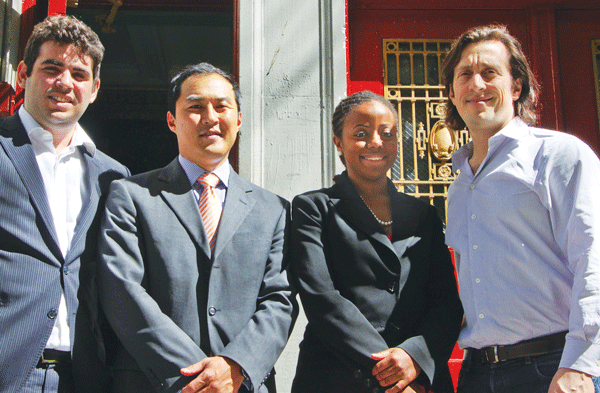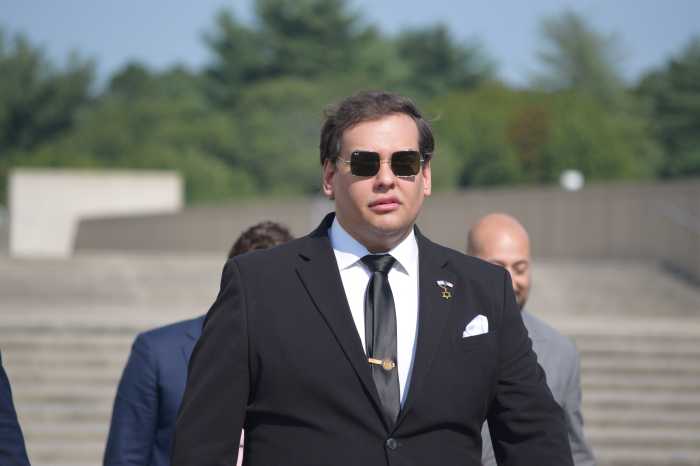 [/media-credit]
[/media-credit]
- At last month’s press conference announcing the new Academy for Software Engineering, second from left, Seung Yu, AFSE’s principal, along with, from left, Scott Schwaiteberg, an AFSE co-founder and advisory board member; Yvonne Williams, a program analyst at AFSE; and N.Y.U. computer science professor Evan Korth, a co-founder of AFSE and chairperson of its advisory board.
BY HILARY POTKEWITZ | Three major school projects are underway in the Union Square area.
Starting with the youngsters, a new middle-to-high school is slated for a site on 15th St. between Union Square West and Fifth Ave. An existing building is being demolished to make way for the new home for the Clinton School for Writers and Artists.
At the high school level, the Academy for Software Engineering — the new tech public school backed by local venture capitalist Fred Wilson — will be moving into the old Washington Irving High School campus this fall with its first class of ninth graders.
The school is one of Mayor Bloomberg’s pet projects, which he’s been promoting widely as part of his PlaNYC initiative to foster an environment of technological innovation.
And far as the digerati are concerned, it’s a program that’s long overdue.
“Every single one of the tech companies that our firm has invested in struggles to find enough talented software engineers,” said Wilson, founder of the investment firm Union Square Ventures. “There are kids, both boys and girls, who desperately want to write software, to make things on their computers for others to use, who don’t have the training available to them,” he said.
Union Square has become one of the city’s fastest growing digital hubs, with 19 tech companies moving into the area over the past year and a half alone, including Apple’s mobile advertising arm iAd, online fashion retailer Net-a-Porter, local business-review site Yelp, and online education platform Knewton.
AFSE Principal Seung Yu said the school will leverage its proximity to these start-ups and establish internships and job-shadowing programs.
The nearby companies are eager to do the same.
“There’s a real need for specific training in this field, and a key part of what companies want is internships and on-the-job experience,” said Jennifer Falk, executive director of the Union Square Partnership. “I recently spoke to one company with about 50 job openings that had to start their own internship program for new employees because they couldn’t find people with the right experience.”
AFSE is open to any student who expresses interest, so its curriculum will offer multiple pathways after graduation.
“As the school leader, I believe college is a great opportunity, and we would love to push for students to major in computer science,” Yu said. But he recognizes that some students will want to enter the workforce immediately in fields such as information technology or computer hardware.
“Some jobs require different skill sets, and our goal is for students to be savvy and skilled enough to get a job right out of high school,” he added.
And for students of college age, The New School is in the midst of a huge construction project for a new campus education center on 14th St. and Fifth Ave.
The 16-story, 375,000-square-foot University Center will include fully wired classrooms, a 600-bed dormitory and an 800-seat auditorium.
“It was important for us to be able to build facilities right here, in the heart of creative New York, artistic New York and labor New York — not off in the margins of the boroughs,” said Peter Taback, a university spokesperson.
The new building is designed to be energy-efficient, LEED certified, and is serving as a laboratory for the university’s sustainable design programs. In that vein, The New School has integrated itself into the various green movements in the area.
Last month, the school partnered with the Union Square Greenmarket to offer free classes in a tent they set up at the market. Grad students and faculty held classes in urban farming, rooftop gardening and small farm co-operatives.
“Union Square has become the locus for the sustainable city that we all hope to build,” Taback said.
The main challenges for schools in the area, particularly the universities, is that the neighborhood is expensive, making it difficult for students to find affordable housing. It’s also tightly packed, so there isn’t a lot of room to build dorms to alleviate the shortage — which is problematic.
Nevertheless, despite some obstacles, the area’s education boom shows no signs of abating.
“Students are a major economic driver in our neighborhood,” Falk said.
































